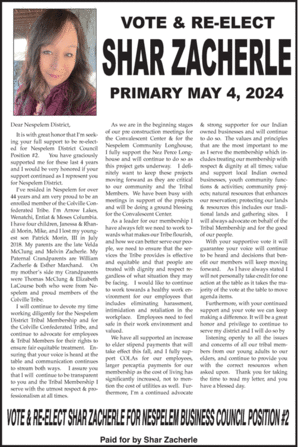Proposed federal budget cuts would take money from public to give to private schools
Last updated 6/21/2017 at 9:39am
Betsy Devos, secretary of the United States Department of Education, has proposed $10.6 billion in cuts for public education institutions, targeting, among other things, after-school programs, technical and career training, special education, and college grants.
The proposal presented by the USDOE would use the savings from the cuts toward giving families the option to use vouchers of federal tax dollars for sending their children to private and religious schools, as well as charter and magnet schools, and for homeschooling.
Locally, and in most rural areas, there are no private schools, which raises concern that money cut from the public schools would simply leave the area, affecting the education of local children who would have no “choice” to go to a private school, but would have money cut from their public school. The public schools which are meant to be government funded would suffer for the benefit of private schools which are meant to be separate from the government, thus the term “private.”
The Washington state constitution prohibits state dollars from going toward religious schools.
The use of government funds to help religious schools also raises the concern of the jeopardy of the separation of church and state.
“It’s never OK for public dollars to fund discrimination,” said Elise Helgesen Aguilar, the Federal Legislative Counsel for Americans United for Separation of Church and State, in an article on the organization’s website. AU was founded in 1947. A concern is that religious schools would not be kept to the standards of public schools, and would be allowed to discriminate against LGBTQ students. Devos said she would leave that for the states to decide.
“Taxpayers can’t afford to fund two different education systems – one public and one religious,” Aguilar said. “Public funds should be for public schools.”
Another concern is that private schools aren’t required to stay up to certain academic standards the way public schools are. U.S. Rep. Mark Pocan (D-Wis.) challenged Devos on this during a congressional committee’s questioning of Devos on the proposal, citing an example of a private voucher school in Milwaukee that failed to teach students how to read.
Sen. Patty Murray (D-WA) is another opponent of Devos’s proposal.
“The budget would weaken communities by eliminating funding for afterschool programs, grant-aid for struggling college students, and teacher and principal training programs, and so much more — even Special Olympics education programs,” Murray said in response to the proposal.
Grand Coulee Dam School District Superintendent Paul Turner has concerns, and is waiting, along with the rest of the country, to see what does get approved, and what the details and ramifications really would be.
“My biggest beef is that every student deserves an education, and I don’t see privatizing as a way to pull that off,” Turner said. “Public schools do a darn good job.”
Nancy Kuiper, Out of Schools program director of Lake Roosevelt’s 21st Century Community Learning Center, supports the initiative.
“We all need to be willing to give up a few things here and there if we are to see any lasting, positive changes,” Kuiper said. “My personal opinion: if the government feels the need to cut this program, then our community (as a whole) will have to come together and decide if, and to what extent, we are willing to step up and take responsibility for our youth. The vision for our kids is greater than what money from the government can provide. I applaud whoever has the guts to make the hard decisions to seek to remedy, and even heal, the gaping wounds in our country.”
The 21st Century Community Learning Center program Kuiper directs uses grants to fund the popular SHARP Kids after-school program, which helps students with homework, among other things. The program will be funded for the 2017-18 school year, but its fate is uncertain after that.
Devos’s budget proposal says cutting the 21st CCLC program would save $1.2 billion nationwide. “The program lacks strong evidence of meeting its objectives, such as improving student achievement,” the proposal states.
Devos’s appointment to head the USDOE has been criticized due to her lack of experience in public education, either in her own education or as an employee.



Reader Comments(0)